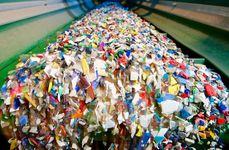
Work starts on the material flow of plastics in Germany 2023
Over the coming months various statistics will be evaluated and, at the heart of the study, a questionaire will be sent to more than 2,000 companies involved in the fields of plastics production, processing and use. The new study plastics flow in Germany 2023 with data on production, processing, consumption, waste collection and recovery of plastics is expected to be published in September 2024.
Read more … Work starts on the material flow of plastics in Germany 2023
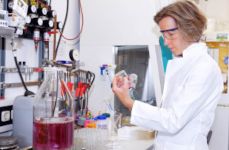
Deep-sea enzyme breaks down PET
Researchers from the universities of Kiel, Hamburg and Düsseldorf have, with the help of complex analysis methods, identified in a database with water specimens from all over the world an enzyme that stems from bacteria from prehistoric times – so-called archaea – in the deep waters off Venezuela. The newly discovered enzyme PET46 is said to be able, unlike the previously known biocatalysts with the ability to break down plastics, to withstand warm temperatures and consequently to break down the polyethylene terephthalate (PET) plastic more quickly. According to the research team, this special characteristic and other biochemical properties make PET46 a highly interesting candidate to combat plastic pollution, both in the sea and on the land.
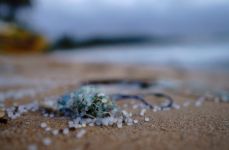
Study: Possibilities for the release of microplastic during recycling
According to a pilot study from a team of scientists at the Scottish University of Strathclyde in cooperation with universities in Canada, UK and New Zealand, there is a possibility that some of the microplastic in the environment could stem from the recycling of plastic waste. The research team concludes from the results of a study that plastics recycling plants could, alongside road traffic, be a significant cause of the planet’s microplastic contamination, and that the recycling of plastic waste should be fundamentally called into question. In order to evaluate the measurements taken at a Scottish recycling plant as well as the conclusions from the study, BKV’s latest study results concerning pellet losses in the industry in Germany were taken into account.
Read more … Study: Possibilities for the release of microplastic during recycling
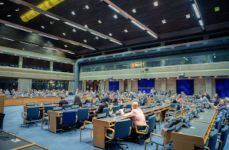
Little progress with the US plastics agreement – producers call for increased efforts for INC-4
The member states of the United Nations want to put an end to environmental pollution through plastic waste by 2040. An initial draft for the agreement was presented at the third meeting of the inter-state negotiating committee that aimed to draw up an international legal instrument to combat plastic pollution (INC-3). The meeting was held from 13 – 19 November 2023 at the headquarters of the UN Environment Program (UNEP) in Nairobi, Kenya. Consensus on the next steps that were needed to draw up the agreement was, however, not reached in Nairobi. The biggest point of contention is whether the agreement should provide for a limit to the amount of plastics produced.
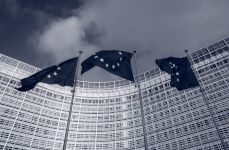
Restriction of microplastic and pellet losses
The sale of products with added microplastic or products that release microplastic during use is gradually being banned in the EU. In the first step, the sale of cosmetics with loose glitter or micro-beads, has already been prohibited. For other products – for example plastic granules that are used on sports grounds – transitional periods apply. Also under preparation are regulations from the European Commission on the limitation of pellet losses in the plastics-processing companies as can occur, for example, during the transport of plastic granules.

Interview with MKV Managing Director Rainer Zies on avoiding pellet losses
Rainer Zies is Managing Director of MKV GmbH Kunststoffgranulate, a medium-sized family-run company in the German Bundesland Hessia. It is specialised in the recycling and compounding of waste plastics from technical applications. As a member of the board of the TecPart association for technical plastic products, Rainer Zies plays an active role for the industry and represents the industry’s interests in public and in politics and also on national and European committees. Apart from that, Rainer Zies is a member of the Technical Committee of BKV GmbH and of the sustainability committee of IHK Frankfurt. Finally, he works on normative basis for the mechanical recycling of plastics in a working group of the plastics committee within DIN, the German Institute for Standardization. There, he is one of the co-authors of DIN SPEC 91446, which describes the quality levels for plastic recyclates.
Read more … Interview with MKV Managing Director Rainer Zies on avoiding pellet losses
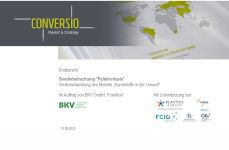
BKV event: "Plastics in the environment - focus on pellet losses"
On November 30, 2023, BKV GmbH held an online event to provide data, facts and possible actions to prevent pellet losses, and also to discuss possible measures along the plastics value chain. Pellet losses in Germany were examined in more detail in a study conducted by Conversio Market & Strategy GmbH on behalf of BKV, which was published as a "Special report on pellet losses". The results of this study were presented at the event.
Read more … BKV event: "Plastics in the environment - focus on pellet losses"
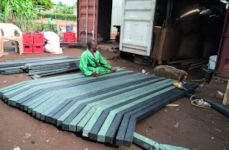
Plasticpreneur wants to encourage plastics recycling worldwide
The aim of the Austrian social & green tech company, Plasticpreneur GmbH, based in Klagenfurt, is to create low-threshold, inexpensive access to the recycling of plastics. For this purpose, the company, which was founded in January 2020, has developed small-scale plastics recycling machines and moulding tools, which are said to be in use through the world.
Read more … Plasticpreneur wants to encourage plastics recycling worldwide
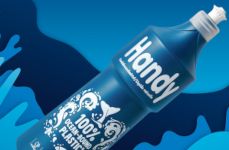
Bottle from marine plastic for Migros washing-up liquid
The bottle containing the washing-up liquid "Handy Fresh Ocean" from Migros – the largest retail trading company in Switzerland – is, according to the manufacturer, produced from plastic waste, which the Swiss company, tide ocean SA, collects in coastal regions. This waste is sorted, cleaned and processed into plastic granules. The material produced from this is used for the production of new products such as the Migros bottle.
Read more … Bottle from marine plastic for Migros washing-up liquid

OCS® certification to prevent pellet losses
"Operation Clean Sweep®" (OCS) is an international programme launched by the plastics industry that sets out to avoid the leakage of plastic granules, flakes and powder, and to ensure that such materials do not get into the environment. The voluntary European OCS® certification system, which came into force in February 2023, now wants to create harmonised processes and procedures for the control and documentation of granule losses throughout the entire plastics supply chain. A joint webinar recently staged by Plastics Europe Deutschland, KunststoffSwiss and TÜV Nord, with the support of BKV, provided information about the basic principles of the OCS® certification.